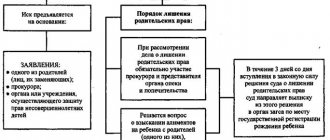The question “is it possible to voluntarily refuse alimony” does not lie in the legal plane. According to current legislation, both parents are obliged to take part in the upbringing and maintenance of the child, regardless of the status of their family relationships.
It is for this reason that refusal to receive or pay alimony is a serious violation, because the mother or father (or both parents) refuse to provide for the minor.
In practice, situations often arise when the parent with whom the child remains to live after a divorce is able to fully provide for him on his own.
Reluctance to communicate and interact with your ex-spouse is a good reason to refuse to accept financial assistance in the form of alimony.
Today we will look at whether it is possible to refuse alimony, how to do it correctly, what consequences are possible and why it is important to resort to professional legal assistance at a very early stage.
What does the letter of the law say?
The law does not accept voluntary relinquishment of parental rights; there is no such article in the RF IC . Having written a waiver on the sheet, you should not consider yourself free as soon as the court makes a verdict, although, according to statistics, most claims on this topic are satisfied - there will be no refusal from the payment for the maintenance of the baby , the money will have to be transferred anyway.
There are families in which the head of the family oppresses the fragile teenager so morally and physically that the mother is ready to ask the father to renounce paternity.
If there is a contender for the place of the head of the family who will be happy to take on all the worries about someone else’s baby by adopting him , then why not do this for the common good, the only problem is in the father’s already occupied place, which he agrees to vacate of his own free will.
Art. 69,70,71 of the RF IC regulates the deprivation of parental rights, and abandonment of a child, in fact, is equivalent to deprivation of the rights of a parent .
An application to the court must be drawn up according to the rules prescribed in Art. 131 Code of Civil Procedure of the Russian Federation. The course of the trial must comply with the format of the requirements of paragraphs. 4 paragraphs 1 art. 23 and 24 Code of Civil Procedure of the Russian Federation.
How to file a claim for court and what documents will be needed
A statement of claim for renunciation of family ties is written in the following format:
- In the upper right corner it is indicated: the full name of the plaintiff, his residential address, contact details. Similar information about the defendant.
- Data about third parties, if any are stated at the court hearing. For example, in the case of a minor, this will be the guardianship authority.
- In the center is the title of the document: “Statement of Claim for Denial of Relationship.”
- The essence of the appeal: full name of the plaintiff and defendant, who they are related to each other, on what basis the relationship arose. For what reason should family ties be annulled?
- Claim.
- List of attached documents.
- Date and signature.
The claim must be in three copies: one remains with the plaintiff, one is given to the defendant for review, and one more to the judge.
The following documents must be attached to the claim:
- A copy of your passport (and have the original with you).
- A document that confirms family ties.
- Receipt for payment of the court fee.
- Documents that support the plaintiff's claims.
In addition to documents, the plaintiff can invite witnesses to the court. A request for this can be indicated immediately in the statement of claim, or it can be stated during the court hearing, and information about this will be included in the protocol.
It is impossible to predict how the case will end, because such cases are not typical, there is very little judicial practice on them. In addition, there is no rule in the Family Code that would somehow regulate this issue.
Procedure for renouncing parental rights
Only the mother can write a waiver of rights, and then immediately after the birth of the baby, when the official registration in the registry office has not yet taken place. Such a refusal is sufficient for the possibility of adoption.
If the baby has already been registered and the mother has a birth document in her hands, then the father or mother, who wants to throw off the burden of worries from their shoulders, must, according to a certain scheme, write an application to the court and guardianship authorities, as well as to the registry office with a request to deprive them of parental rights, at their best will.
The court will consider the appeal and make its decision ; without this, the application cannot have any legal force and meaning, it is unauthorized. Immediately, at this court hearing, the issue of assigning alimony is decided , and its amount is determined.
After the court decision comes into force, within three days you should go to the registry office , where the data regarding the origin of the child will be changed.
Presence of the prosecutor and guardianship authorities at the trial
As defenders of children's rights, there must be a prosecutor and representatives of the PLO at the trial ; if their presence is not ensured, then the trial cannot take place, it will be invalid.
These representatives of government bodies will monitor the issues of providing the minor with alimony, place of residence and securing his rights in a court decision.
Drawing up an application to the court for abandonment of a child (sample)
Sample application for relinquishing parental rights:
The application is drawn up, addressed to the court, to the PLO, to the registry office , each addressee on a new line, indicating the correct and full name.
Next, you should indicate who the application is from, entering your full name, date and place of birth, address, and passport details. Having entitled this document below with a statement, we proceed to the descriptive part.
It is necessary to write that you hereby voluntarily and unconditionally renounce the rights of a parent in relation to your son or daughter who was born at that time, there, in full, indicating the full name of the offspring, and express your consent to the deprivation of your parental rights and the adoption of your child in the future in accordance with current legislation.
You should also write that you understand that the child may be adopted. It is quite clear to you that you will not be able to cancel this refusal after a court verdict is issued , which will approve your refusal.
Even if the court’s decision does not deprive you of your rights as a parent, you will not be able to cancel this refusal after the decision to adopt the child gains force.
If the refusal is written by the father, then on a new line it should be clarified that the parental rights of the mother of the specified child (full full name of the mother) are retained in full.
It should state below that you have read and understood the above and are signing it freely and intelligently. Below you can write that you ask the court to consider the case without your presence at the trial.
The locality, the date should be written in full not in numbers, but in words, and signed with the full name deciphered.
This application must be notarized. The notary will not only certify the signature, but will also register this document.
If you already have a guardian or adoptive parent, you can use a simplified scheme . On the basis of Article 129 of the RF IC, the father can contact the PLO and the notary with a statement of his voluntary consent to the adoption of his offspring. In this case, litigation will not be required .
What to do if a parent does not accept a child: advice from a psychologist
Accepting a child for who he is is one of the most difficult and at the same time the most important elements of education. How children feel when they are not accepted, and what mistakes parents make when they unwittingly demonstrate non-acceptance, says Ksenia Dubrovina, a psychologist at the SAO family center.
Rejection is quite painful for any child. It manifests itself mainly when the baby does not meet the expectations of the parents.
How parents demonstrate rejection
- The mother is always dissatisfied with the child, constantly making comments to him (“Don’t fidget, sit quietly, don’t interrupt, don’t disturb!”).
- Comparison with other children (“Take example from your older sister / classmate!”).
- The mother rarely or hardly praises the child and rarely says that she loves him and is proud of him.
- Lack of tactile contact or demonstrative avoidance of it when the child takes the initiative (wants to hug mom, but mom pulls away).
- A mother or other significant adult gives an example of herself as a child (“I wasn’t like that at your age!”).
- The child is often scolded in front of strangers and complained about his behavior, causing a feeling of shame.
- They attribute negative motivation (“You just want to piss me off! You’re doing it to spite me!”).
- They do not support the child’s initiative, his interests, and condemn them.
How does the child feel?
For a child, the love and acceptance of parents is a feeling of security. It is this that loses its power when non-acceptance is demonstrated for too long. “If I am loved and accepted, it means that I am good enough and the world is good enough. And then you can calmly grow and develop” is the message that the child learns from the host parents.
If the connection with the mother (and therefore safety) is in question for the child, he is constantly under stress.
Consequences for the child’s psyche:
― fears, anxiety, restlessness, ― depressive moods, feelings of guilt, ― low self-esteem, self-doubt, ― auto-aggressive behavior, ― aggression towards parents or other people in the environment, ― inappropriate behavior in order to attract attention (“Mom, well notice me!”), ― psychosomatic diseases (“If I get sick, then I will still get care for myself!”).
If not accepting your child has become the norm for you
The main thing is to understand the reasons. You may not be aware of them. For example, the child was originally unwanted or it reminds you of your ex-husband's mother, whom you are still resentful of. Such topics should be discussed with a psychologist in personal therapy.
Watch how you interact with your child. Do you really constantly scold and pull him back? If yes, then try to accept the fact that the child is a separate person and he has the right to his own desires, needs and their expression, even if you don’t like them. Try to notice only the good in your child for a while.
Hug. Tactile contact is necessary for children.
At every opportunity, say that you love your child and are proud of him.
Spend leisure time together: sharing positive emotions is very important. Walking, board games, reading books or watching movies together will help you with this.
Show genuine interest in your child's hobbies.
The most common mistakes in re-educating a “difficult” child
⠀
1. “Good intentions” Parents often say that they scold their child so that he becomes better, in order to motivate him to change. However, the child reacts more not to the meaning of the remark, but to the form in which it is made. ⠀If you reprimanded a child in a raised voice, then most likely he will be upset or offended, but will not understand that it was “for his own good.” Therefore, remember to communicate in a respectful manner. This way you have a better chance of being heard.
2. “Let him change first” Parents shift responsibility to the child: “we will stop scolding him if he starts behaving normally.” But it is adults who must take responsibility for changing the situation. Your child's life depends on you, not the other way around.
3. “He was just born that way” Explaining problematic behavior by the child’s personal qualities. “He’s such a person” or “cool character, well, he’s like a grandfather.” It is necessary to see the problem not in the child himself, but in his behavior. Behavior depends on many factors and can most often be influenced.
"This is not my daughter"
One day, the mother of fifteen-year-old Anya came to the SAO family center for an appointment. It turned out that a year ago, mother and daughter, who had previously had friendly relations all their lives, began to quarrel. Olga, Anya’s mother, claimed that her daughter seemed to have been replaced. She began to come home late, no longer helps around the house, and all comments seem to fall on deaf ears or are even expressed obscenely. "This is not my daughter
, - Olga snapped.
“ Do something with her
.”
The psychologist held several consultation meetings separately with mother and daughter. After some time, the path to changes in the family situation was found. It turned out that the mother could not accept the age characteristics of her daughter. Anya’s inner world became uninteresting to her, she said: “I don’t even want to communicate with her anymore.” Olga had her own vision of her daughter's future. And when something didn’t go according to her plan, she felt deep disappointment in the girl.
Love and the desire to understand her child helped the woman see her role in the conflict. After some time, the quarrels faded away, and Anya, feeling her mother’s warmth, made a compromise herself.
Of course, miracles don't happen. Anya did not become an ideal child, in her mother’s understanding. She still exhibits her “daddy personality.” But now mother and daughter are trying to communicate more, talk through disagreements that arise, rather than hush them up and get irritated, and certainly respect the right to their opinion.
If you have a conflict situation with your child and you have reached a dead end in resolving it, in the capital’s family centers they will help you find answers to the most difficult questions.
Source
Press service of the Department of Labor and Social Protection of the Population of Moscow
Consequences of relinquishing parental rights
Voluntary relinquishment of parental rights has the same consequences as forced deprivation .
Refusal involves removal from:
- functions of education (care),
- representing the child as his offspring in all instances,
- protection and demand from strangers holding the baby,
- rights to inherit the child’s property after his death,
- rights to receive benefits and benefits from the state due to real parents.
Such fathers should not count on alimony from abandoned children; in the event of incapacity for work, no court will be able to force a child abandoned by his parents to provide assistance in their maintenance.
By the way, on our website there is an application form for forced deprivation of parental rights, as well as for the adoption of a child (here).
Is it possible to refuse in favor of another person?
The mother and father can issue a refusal in favor of another person or a general one. General implies the opportunity to adopt a child for upbringing to an indefinite number of persons. If within a reasonable time, the minor is not adopted, the parent will be deprived of his rights.
Targeted refusal implies the transfer of rights to a specific person. It is used when a minor is adopted by the new spouse of the second parent or when the child is refused in the maternity hospital.
Important! The absence of information about a specific citizen in the document allows the guardianship department to transfer the newborn for adoption to the family next in line for adoptive parents. And if specific information is available, the baby will be handed over only to the specified person.
If the citizen indicated in the refusal does not want to adopt the child, then parental rights remain with the natural parent.
Do I need to pay alimony after a positive court decision?
The characteristics of the boy will be entered into the electronic database of information for adoption; during this entire period before those willing to become a new family for the baby are found, alimony must be paid . After the adoption process is completed, the biological parent is released from alimony on the basis of Article 120 of the RF IC.
Yes, of course, it will not be possible to get rid of alimony payments immediately and forever, and they will need to be paid from the moment the court makes a decision until the day the adoption is formalized.
If the child is not adopted, then until he comes of age, alimony should go to his mother, guardian or institution where the child lives.
Sometimes, when in fact a married couple has separated for a long time, and the mother has another man who agrees to immediately adopt her child, the woman can ask her ex-husband to formalize a voluntary refusal , in which case the deduction of alimony to the natural father can practically be avoided.
The minimum period for which alimony will be withheld is six months.
Age of new opportunities
- The second half of life is a wonderful age of mature intellect, life experience, still fairly good health and fulfilled maternal responsibilities. This is that very fertile time when you can fully use the available opportunities for self-realization, satisfy your inclinations and interests, without using the subjunctive mood “If not for the circumstances, I would...”.
- Many women at this age, having raised children, open their own business, are actively involved in social work, devote more time to their hobbies, develop their artistic abilities, travel... A successful, accomplished person at any age remains optimistic, cheerful and calm, and until the end of his life loses flexibility of thinking and ability to develop as a person.
- At this stage of life, it is important to positively accept age-related changes, to see in them not only limitations, but also the opportunities that years and acquired social status open up.
Read more: The best books about the psychology of relationships
How long does it take for another person to adopt a child?
Until a person registered in the registry office as a father is deprived of his rights as a parent, no legal action, including adoption, can be taken by any body or service.
Since the decision to voluntarily renounce one’s rights as a parent will be made and will come into force only after six months have passed from the date of filing the application to the court , after which the civil registry office will make changes to the child’s birth record, crossing out the name of his father, and will release this line. Then adoption will become legally possible.
Freedom as a disaster
A woman has a lot of free time at her disposal, both today and tomorrow, and in a week it can be filled according to the principle “I want” and not “I have to”. And it turns out to be a disaster! These seemingly positive changes are not at all encouraging.
Letting go of parental responsibilities often causes depression and a feeling of no future.
Some women do not see anything attractive in the fact that in the future they will have more free time and, in general, more freedom. They are afraid of the long, aimless hours that await them in the future. The feeling of the meaninglessness of existence, impending old age and self-doubt becomes so global that it completely overshadows the awareness that there is finally an opportunity to find new or resume previous points of application of one’s energy.
Legal consequences
If a child does not want to communicate with his parents and have any relationship with them, then the legal consequences depend on the method of refusal to communicate. If the minor at the trial refused to maintain contact with the parent when establishing a communication schedule, then the court will either refuse meetings altogether or reduce them as much as possible.
The first is possible in the presence of other aggravating circumstances: failure by the parent to fulfill responsibilities, lack of payment of alimony, etc. If an adult does not want to maintain a relationship with his parents, he has the right to do so. This cannot be confirmed by legal documents. Such issues are resolved at the interpersonal level.
- loss of rights to communicate with the child and participate in his life;
- transferring it to provide for relatives, the state, and then, if possible, to another family;
- lack of inheritance rights in the event of the death of a minor;
- loss of the right to claim maintenance from the child, etc.
As a result, no one can officially abandon their mother and father. There is no legal procedure that allows you to do this and obtain documentary evidence of such a decision. The final separation of a child and a parent is carried out in the event of deprivation of the latter’s rights.
If a son or daughter who has reached the age of 18 does not want to maintain a relationship with his mother or father, he can put this into practice. However, a claim of this kind will not be satisfied.









